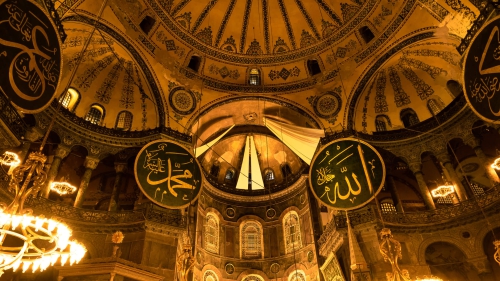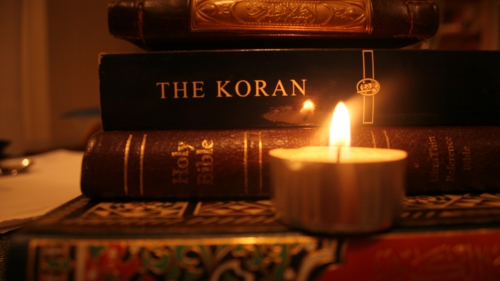Do Jews Worship Ezra?

Long before Daesh (Islamic State) began murdering tens of thousands of woman and children in order to establish God’s right order in the world, Pope Gregory VII (r. 1073-1085) got the massacre ball rolling. Upon assuming the papacy in 1073, Pope Gregory issued official proclamations urging Christian princes to recover lands occupied by Muslims in Spain, over which he claimed papal sovereignty on the basis of previous rule and right. These decrees were really the beginning of the Christian Crusades against Islam.
Gregory’s ideas about Christian war, which were extended to fighting against domestic enemies of the papacy and the Church (like Emperor Henry IV), were also supported by his successors in the papacy. Gregory VII’s idea that popes were responsible for establishing the right order in the world, which could only be obtained through righteous Christian violence directed by the papacy, forms the political basis for all later Christian Crusades.
It also further stimulated an all out missionary battle against Judaism and Islam that had already begun in Spain, that led Muslims like Ibn Hazm to respond in kind. Religious truth became a zero sum game: anything positive said about another religion was seen as a weakening of your own side. The goal was not to modestly try to harmonize various religious perspectives of the one and only God; but to self-righteously exaggerate religious differences, well beyond any reasonable understanding of the two sides.
If one believes that there is only one God who is revealed by many different inspired prophets, then we should be able to learn more about God’s will by gaining insights into our own unique revelation, from other revelations of that one God. Since all monotheistic scriptures come from the one and only God, we should view other scriptures as potentially enriching our understanding and appreciation of our own scripture. But in the middle ages almost all readers thought of revelation as a zero sum sport like tennis; rather than a multiple win co-operative sport like mountain climbing.
In a zero sum game any value or true spiritual insight I grant to another scripture somehow diminishes my own. This was the result of the influence of Greek philosophy’s emphasis on the logic of the excluded middle. Something is either true or it is false. There is no other option. If two propositions contradicted one another, one or both of them must be false.
This would mean that if my religion is true, yours must be false. In modern terms, light could not be both a particle and a wave. Yet we now know that light is indeed both a particle and a wave, and at the same time.
This medieval situation did not improved much in modern times. In the last two centuries university academics have written many studies of comparative religion which they claim are objective and not distorted by their religious beliefs.
Unfortunately, academics who treat other religions academically usually do not believe that other scriptures are actually Divinely inspired. Indeed, many academics do not believe that even their own sacred scriptures are Divinely inspired. They use the same kinds of explanation to understand a revealed religion that they would use to explain secular history and literature.
As a rabbi I follow a different model.
For example, the Mishnah (an early third century compilation of the oral Torah, states, “Adam was created as an individual to teach you that anyone who destroys a single soul, Scripture imputes it to him as if he destroyed the whole world.” (Mishnah Sanhedrin 4:5)
And the Qur’an states,”one who kills a human being, unless it be for murder or for spreading mischief in the land, would be as if he slew the whole people, and if any one saved a life, it would be as if he saved the life of the whole people” (Qur’an 5:32)
Academics explain the similarity of the two statements by assuming that since the Jewish statement is several centuries earlier than the Qur’an, Muhammad must have heard it from a Rabbi or other educated Jew in Medina.
But I believe Muhammad was a prophet of God who confirms the Torah of prophet Moses. Muhammad has no need to learn this statement from another human being. Academics might reply that the statement is not found in the written Torah; it appears in the oral Torah written by the Rabbis in the Mishnah more than 1000 years after Moses.
But the Rabbis maintain that the Mishnah is part of the oral Torah that was passed down from Moses through many generations just as Ahadith have been passed down orally through the generations. Indeed, the Qur’an itself introduces this statement as follows, “It is because of this that We ordained for the Children of Israel “one who kills a human being …” (Qur’an 5:32)
No prophet of God needs to be informed by another human what should be written in Holy Scripture. God is the source of all Divine inspiration. There are several verses in the Qur’an that mention things from the oral Torah. My perspective is that prophets and Holy Scriptures can not in reality oppose one another because they all come from one source. Prophets are all brothers; they have the same father (God) and different mothers (motherlands. mother tongues, nations, cultures and historical eras).
All of these factors produce different rituals and legal systems, but their theology can differ only in small and unessential details. Religions differ because the circumstances of each nation receiving them differ. Where sacred Scriptures differ they do not nullify each other; they only cast additional light on each other.
Take for example, the prophet and priest Ezra. Was he a prophet and priest like Ezekiel, or a son of God like Jesus?
A Jewish convert to Islam al-Samaw’al (d. 1175) accused Ezra of interpolating stories such as Gen. 19:30-38 in the Bible in order to sully David’s origins and to prevent the rule of the Davidic dynasty during the second Temple. A century earlier Ibn Hazm, an Andalusian Muslim scholar, explicitly accused Ezra of being a liar and a heretic who falsified and added interpolations into the Biblical text.
Ezra was a good target to attack because he is specifically mentioned in the Qur’an: “The Jews call ‘Uzair a son of Allah, and the Christians call the Messiah a son of Allah. That is a saying from their mouth; (thus) they only imitate what the unbelievers of old used to say (pagans who believed their many Gods had many divine or semi-divine children). Allah’s curse be on them: how they are deluded away from the Truth! (Qur’an 9:30)
Now there are a half dozen different places in the Qur’an where the Christian claim that Jesus is the son of God is refuted and denied. For example, “Jesus son of Mary, did you ever say to people ‘worship me and my mother as Gods beside Allah?’ and he will answer, ‘How could I say what I had no right to say?’” (Qur’an 5:116)
Also, “Jesus in the sight of Allah is like Adam” (Qur’an 3:59). and “The Messiah, Jesus son of Mary, was no more than a Messenger of Allah…do not say :Trinity. Stop saying that.” (Qur’an 4:171)
And general statements like “those who say, ‘Allah has begotten a son.’ have no knowledge about it, nor did their forefathers; this is a monstrous word that comes from their mouths. They utter nothing but a lie.” (Qur’an 18:4,5) and (Qur’an 5:72-75), and (Qur’an 19:30).
Indeed, the verse that follows (Qur’an 9:30) specifically applies to Jesus: They take their priests (Ahbar) and their monks to be their Lords in derogation of Allah, and (take as their Lord) the Messiah the son of Mary; yet they were commanded to worship but One God: there is no god but He. Praise and glory to Him: (Far is He) from having the partners they associate (with Him). (Qur’an 9:31)
So how shall we understand the Qur’an statement: ‘The Jews call ‘Uzair a son of Allah”?
Al-Tabari and Abdallah ibn Ubayd state that only one Jew (Pinhas) viewed Uzayr as the son of God. Ibn Abbas and Qurtubi say only four Jews, whose names they record, believed Uzayr as a son of God. Ibn Hazm said that just a small group of Jews in Yemen worshipped ʿUzayr as a son of God in some remote period. Since the Jews of Yemen, who have lived there since the third or fourth century, do have an old tradition not to name their children Ezra, perhaps there was such a small heretical sect that later generations wanted to forget about.
But most Christians to this day, proudly proclaim that they do indeed worship Jesus, the Son of God. Jews however, have always vehemently denied that they worship any partner or other God except the one and only God. So how can we understand the difference between the two seemingly parallel statements in ayah (Qur’an 9:30)?
There is a Hadith in Sunan Al-tirmidhi which says that the Jews worship their Rabbi’s. One of the companions said that this is not true. Then Muhammad said that they accept what their Rabbi’s say over the word of God; so in this way they worship them. This Hadith provides an important clue.
Christians actually do venerate and pray to both Jesus and his mother Mary; but only some Jews figuratively venerate their rabbis as Muhammad says because, “they accept what their Rabbi’s say over the word of God, so in this way they worship them”.
This Hadith is correct. Orthodox Jews believe in both a written Torah and an oral (unwritten) Torah which has been handed down for over 3,200 years, ever since Sinai. They often observe Judaism according to the rabbinic interpretation of this oral Torah.
For example, the Torah states that the new Jewish year starts: “On the first day of the seventh month you shall have a holy convocation. You shall not do any ordinary work. It is a day for you to blow ram horns”. (Numbers 29:1)
This one day holy day, was turned into a two day holy day some 17-18 centuries ago, when most Jews lived outside the Land of Israel and could not be sure exactly when the lunar new year calendar began. A similar issue exists for Muslims in determining the start of Ramadan, which is why in some years two different days mark the beginning of Ramadan in various parts of the world.
Thus, different circumstances produce different rituals and legal systems, but basic theology can differ only in small and unessential details. As the sage of Konya, Jalal al-Din al-Rumi says, “Ritual prayer might differ in every religion, but belief never changes.” (Fihi Mafih 49)
So we should emphasize our common beliefs and respect our particular differences because, “To each among you, We have prescribed a law and a clear way. If Allah willed, He would have made you one nation, but (He didn’t in order to) test you in what He has given you; so strive (compete) as in a race to do good deeds. You all will return to Allah; then He will inform you about that in which you used to differ.” (Qur’an 5:48)
Topics: Christianity And Judaism, Interfaith, Judaism
Views:9430
Related Suggestions

















